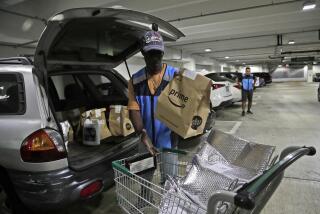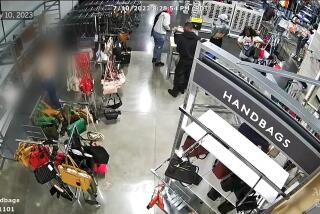$600-Billion Underground Economy Pervades Nation
- Share via
As the Clinton Administration discovered in its tortuous search for an attorney general, the nation’s underground economy--including the work of everyone from drug traffickers to illegal immigrant baby-sitters--touches nearly every corner of American life.
Despite crackdowns by tax collectors and shifts in the economy that have slowed its growth in recent years, the underground economy is estimated to account for as much as $600 billion annually, or roughly 10% of the nation’s business activity.
While about one-third of these dollars are tied to illicit businesses such as prostitution and the drug trade, the other two-thirds of the underground economy involves routine transactions not honestly reported to the government. Common examples are waiters who do not disclose their tips to the Internal Revenue Service, along with construction workers paid in cash under the table by contractors.
Experts who study this shadowy part of the economy say it is fueled by greed and desperation, along with competitive business pressures, illegal immigration, cutbacks in government-provided social services and a desire for convenience.
“The underground economy is a survival economy,” said Bruce Wiegand, a professor of sociology at the University of Wisconsin at Whitewater and author of many articles on the underground economy. “The child care stuff is just the tip of the iceberg.”
In all, the IRS estimates that the deficit-ridden federal government loses as much as $127 billion a year in income tax revenue, up from $30 billion in 1973, mainly because of underground economy schemes.
The impetus for the underground economy comes partly from businesses willing to break the law to cut their costs. Some employers bully workers into accepting pay in cash or personal checks so the firms can dodge the expense of employee payroll taxes and workers’ compensation insurance.
Trouble is, when these workers someday want to collect legitimate benefits such as Social Security, “there won’t be anything in the kitty for them,” said Los Angeles employment lawyer Joel Kelly.
In California, labor officials say some of the biggest offenders are the construction business, agriculture, restaurants and, particularly in Southern California, the garment manufacturing industry.
Alma Aleman, a sewing machine operator at a Los Angeles garment manufacturing shop, said one of her bosses urged her three weeks ago to take a personal check rather than a regular paycheck showing the amounts withheld for taxes.
But Aleman said she resisted, demanding to know: “How can I prove you’re taking deductions if you won’t give me a paycheck stub?”
“I was there (arguing) for more than an hour before they would give me a proper check,” added Aleman, 27, a native of El Salvador who was interviewed in Spanish through an interpreter.
“Then they pushed me out the door and slammed the door in my face.”
Yet in many cases, it is the workers themselves who want to be paid under the table. Among these workers are welfare cheats who fear that they will lose their benefits checks if their wages are reported to the government. Others include illegal immigrants who are trying to evade border-control authorities.
When Kelly and his wife last year interviewed candidates for the full-time job of baby-sitting their newborn daughter, all the applicants had one request in common: They wanted to be paid “under the table,” in cash.
Being a full-time baby-sitter, Kelly explained, brings in more money when no taxes are involved than working for a fast-food restaurant. “These are industrious people, and you certainly can’t make $250 a week in cash at McDonald’s,” he said.
Aleman, a 1986 arrival to the United States who is working in this country legally, admitted that she once asked her boss about whether there was a way she could avoid payroll deductions. She later dropped the idea when the boss demanded a 20% pay cut in exchange for honoring the request.
At the time, Aleman explained, she was working roughly 60 hours a week and making only $130 to $140 before deductions--far less than the minimum wage of $4.25 an hour and below her more recent wages of $180 a week.
“I couldn’t survive on what I was being paid,” she said.
Still, experts say the underground economy, although huge, probably has not grown as fast as the rest of the economy in recent years. With more and more business activities disclosed by paper trails from credit card transactions and insurance payments, it has become harder to escape detection by authorities.
Some of the biggest traditional offenders--restaurants, wealthy investors, physicians and others that once operated mostly with cash--apparently have vastly improved their tax compliance.
“Twenty-nine years ago, there was no Medicare, no Medicaid and a much smaller pool of (private) health insurance,” explained David Levine, chief economist for New York-based Stanford C. Bernstein Co., a securities research firm. “Doctors were conventionally paid in cash and had greater opportunity to under report income. Today, that’s not the case.”
In the high-end of the restaurant business, he said, cash skimming has been a lot more difficult because so many customers pay with credit cards.
“You certainly continue to hear talk that restaurant people are on the take . . . but times have changed,” said Jeff Spiegel, owner of the New York City restaurants Extra! Extra! and West End Gate. “So many people accept plastic now and you have a redoubling of efforts by (the IRS) to make certain tip income is reported.”
New IRS record-keeping requirements also have made it more difficult to avoid taxes.
Starting in the late 1970s, the agency began requiring banks and other financial institutions to report interest and other investment income so it could compare the reports to taxpayer returns. Meanwhile, restaurateurs now have to submit estimates of tips received by their waiters, based on the establishment’s gross receipts.
What’s more, the number of workers in the best position to cheat--the self-employed or unpaid relatives in the family business--has declined dramatically in the last 40 years. Self-employed and unpaid family workers have dropped from 18.4% of the total work force in 1952, to 9.9% in 1972 to 8.8% last year.
Even excluding the fast-shrinking agricultural segment, self-employed and family workers still fell from 10% of the work force in 1952 to 7.5% last year.
“From a tax point of view, we have not seen any indication of huge growth” in the informal economy, said Robert Parker, associate director for national economic accounts at the Bureau of Economic Analysis.
Yet the underground economy remains pervasive enough that many legitimate businesses are squeezed by competitors who cheat.
And the sluggish economy of the past three years did not help matters.
For example, Steve Fredrickson of Sylmar said he closed his family’s construction firm in 1991, largely because it could not match the bids of competitors that, he contended, held their prices down by illegally avoiding taxes and workers’ compensation insurance.
Playing by the rules “puts you at a competitive disadvantage,” Fredrickson said. Most developers looking for a construction firm “hire whoever is cheapest,” he said, adding that “they don’t care why” one firm charges less than another.
Still, IRS surveys that claim a voluntary tax compliance rate of more than 83% indicate the vast majority of Americans are honest when it comes to paying taxes.
In Kelly’s case, he said it took persistence to find a baby-sitter willing to work the legal way, with the proper taxes withheld from paychecks.
As a lawyer, Kelly said, he did not feel right “advising clients about doing things a certain way, and not doing those things” himself.
Besides, Kelly said, he was mindful of the humiliating experience of Zoe Baird, whose nomination for attorney general was withdrawn after it was disclosed that she hired two illegal immigrants and paid no employment taxes for them until recently.
“I’m chicken,” Kelly said with a laugh.
More to Read
Sign up for Essential California
The most important California stories and recommendations in your inbox every morning.
You may occasionally receive promotional content from the Los Angeles Times.










